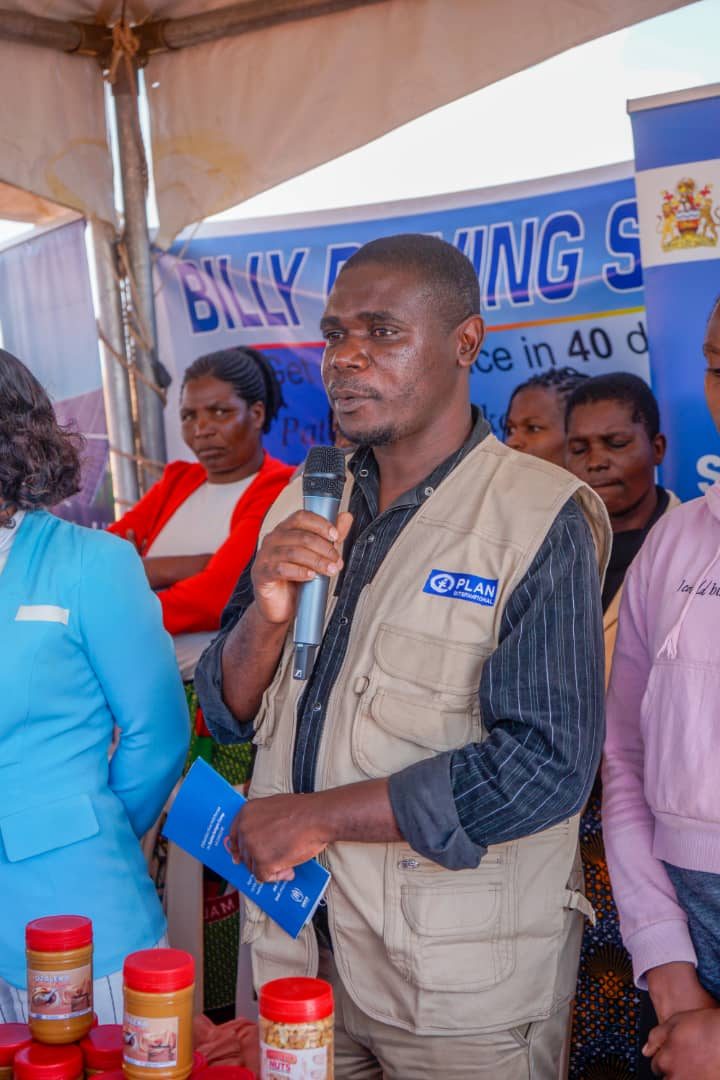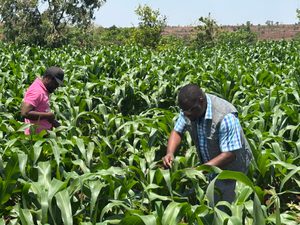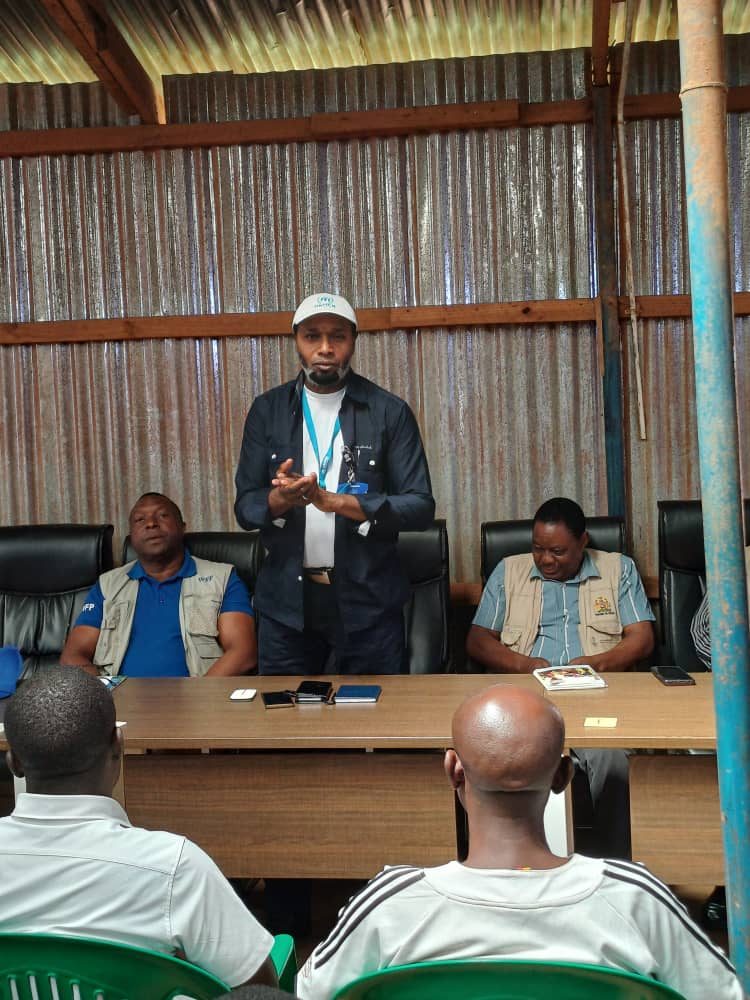Dzaleka Refugee Camp hosts over 57,000 people fleeing violence. Refugees come from the DRC, Burundi, Rwanda, Ethiopia, Somalia, and beyond. For years, UNHCR funding kept basic services running. Today, those services are collapsing under deep aid cuts. When UNHCR’s funding was on track, it ensured basic protection and services in this camp. But as of late March, the agency reported it had received only 12% of the $26.3 million needed for Malawi this year.
Community-based security teams that once patrolled the camp streets have stopped their rounds. Refugees who once dared venture out at night to sell vegetables or seek work feel unsafe. Scattered violence and exploitation – from theft to assault – inevitably rise when no one is watching.
Plan Malawi Project Manager for the Services for Refugees and Asylum Seekers Project, funded by UNHCR, Lawrence Maulidi says, “This is is a crisis of human dignity, is not just a funding crisis.”
Education: Future at risk
Schooling in Dzaleka was already limited by policy and now the situation has worsened. Cash for teachers and supplies are limited. Few classrooms remain sound, textbooks are nearly gone and Plan Malawi staff in the camp are reporting of leaking roofs during heavy rains.
Parents and guardians are scared as they don’t know what the future holds. A Congolese mother whose 12-year-old daughter dreams of becoming a doctor, with tears in her eyes, she clutched her child’s hand, “My daughter wants to be a doctor, but if the funding cuts continue what hope do we have?” Such fears are heard every day. Already, most refugee children drop out early and very few refugees go to university.

“The children’s dreams can die without support,” Maulidi warns. UNHCR-funded cash grants once paid fees and books but those grants ended this year and enrolment is plunging fast. Plan Malawi staff supply uniforms and exercise books, but resources remain too scarce to serve all. Without stable schooling, children lose hope of higher learning.
“My daughter wants to be a doctor, but if the funding cuts continue what hope do we have?”
Congolese mother
Health and rights on the brink
Health services in Dzaleka were already stretched; now they are collapsing. UNHCR-supported clinics have run out of medicines and essential services and there are stories of refugees who suffer from diabetes and hypertension, conditions that are manageable – but even hospitals which used to partner with UNHCR now refuse service because the funding is gone. One month ago the camp clinic still had insulin, now not even painkillers are guaranteed.
Essential health needs are ignored and these cuts hit women and girls hardest,” Maulidi says. Reproductive health services face imminent closure, antenatal care, safe deliveries, and family planning hang by a thread too. Maternal and new-born deaths could rise sharply.
Plan Malawi expanded girls’ clubs this year which taught health, rights, and gender-sensitive education. “These programmes are lifesaving: they give girls the knowledge to seek care, and teach communities to protect young mothers. But if the funds disappear, those sessions will halt, and the hard-won gains in health literacy will erode,” he adds.
Livelihoods and cash transfers
Starvation is a real fear in the camp. For years, families supplemented their small gardens with World Food Programme (WFP) cash aid – about MK18, 000 ($10) per person each month. In February, that cash was slashed by 50% dropping to roughly $8.60 per person. Next, it may vanish altogether. For a family that once ate only because of that cash, this cut means hunger.
“Half rations become full crises, and without aid, families face starvation,” Maulidi notes. Plan Malawi urged refugees to grow crops but only to see crops fail under El Niño droughts that affected Malawi and other Southern African countries. Worse still, refugees and villagers lack fertilisers, tools, and irrigation support. Now fields lie fallow and savings vanish in food purchases.

Plan Malawi under the Services for Refugees and Asylum Seekers Project, accelerated livelihoods initiatives but the future for this project is also uncertain as it is fully funded by UNHCR.
“Half rations become full crises, and without aid, families face starvation”
Lawrence Maulidi-Services for Refugees and Asylum Seekers, Project Manager
Dreams deferred: Youth and entrepreneurship
Plan Malawi’s youth programmes – including a Youth Advisory Panel and the Dzaleka Children’s Parliament – have provided spaces for children and young people. The Children’s Parliament, for example, is a platform where 75 young refugees (45 girls, 30 boys) debate education, protection and gender equality.
Florence, now 18, tells of how at 15 she joined that parliament and learned to advocate for her rights. Through it she campaigned for her friend with a disability to speak at a national budget meeting. These programmes teach self-confidence and civic skills. But without UNHCR’s facilitation, the venue, outreach and coordination for such activities vanish.
“Without clear prospects, we risk losing a generation. Idle young men and women are vulnerable to exploitation, early marriage, or joining illicit jobs,” Florence says.
Plan Malawi’s solidarity with refugees
Over the past year, Plan Malawi reached thousands in Dzaleka. In this bleak landscape, the team has been fighting to keep hope alive by mobilising a broad response in the camp, demonstrating what solidarity looks like in practice. “We supplied school kits, supported health clubs, and launched farms. We helped 5,000 children improve their literacy skills and we trained 1,200 women in small-business entrepreneurship. Our teams worked day and night to keep hope alive, but the funding cuts threaten every achievement we’ve made,” Maulidi explains.
UNHCR still commits support to the camp. The Country Representative, Kouame Cyr Modeste emphasises that despite the current funding challenges, UNHCR remains present and firmly committed to supporting refugees in Malawi.
“In close coordination with the Government of Malawi and humanitarian partners, UNHCR is doing everything possible to maintain essential protection and assistance services. While the operational environment is difficult, every effort is being made to explore solutions, prioritise the most critical needs, and advocate for additional resources. Our commitment to the well-being and dignity of refugees remains unwavering.” Modeste said.

“In close coordination with the Government of Malawi and humanitarian partners, UNHCR is doing everything possible to maintain essential protection and assistance services. While the operational environment is difficult, every effort is being made to explore solutions, prioritize the most critical needs.”
Kouame Cyr Modeste- UNHCR Country Representative
As the camp stands on a shaky ground, Maulidi looks back, “I have seen the courage of refugees here: single mothers raising children under hardship, youth pushing back tears to study by candlelight, and entire communities dancing at festivals of hope. Today, June 20 and every day after, let us show them that they are not forgotten.”
On this World Refugee Day, the theme is “Solidarity with Refugees” and Plan Malawi stands in solidarity with refugees at Dzaleka Refugee Camp. A photo op is not enough and hashtags must turn into action.
“I have seen the courage of refugees here: single mothers raising children under hardship, youth pushing back tears to study by candlelight, and entire communities dancing at festivals of hope. Today, June 20 and every day after, let us show them that they are not forgotten.”
Lawrence Maulidi-Services for Refugees and Asylum Seekers, Project Manager


